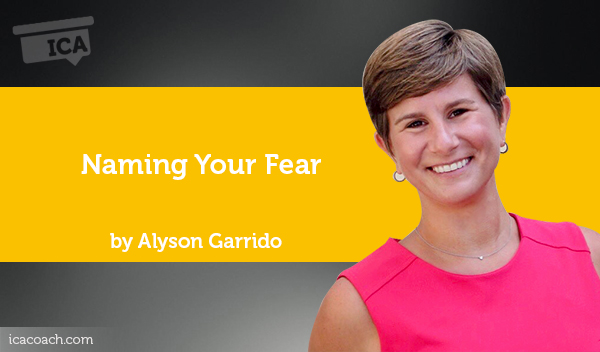
A Coaching Power Tool Created by Alyson Garrido
(Career Coach, UNITED STATES)
He who has overcome his fears will truly be free.―Aristotle
Case Study
Joanne was very good at her job as a Social Worker. She enjoyed her clients and knew she was making a difference in their lives. Joanne, like many of her coworkers, knew that layoffs were going to come to her team, probably sooner than later. As the new person, all signs pointed to Joanne losing her job. She started to look for something new, freshened her resume and even had some promising interviews. She was terrified, however, of being laid off. The idea of not having a job was a constant worry that caused her a great deal of anxiety and caused her to go into a rabbit hole of despair.
When she decided to address this issue in coaching she was able to examine the true root of her fear. If she lost her job, she would find a new one. Money was not the issue, her husband could support them and unemployment compensation would be available. The clients she enjoyed so much would go away, but so would the unpleasant paperwork and disgruntled coworkers. Losing the job may even be a relief, so why was she so nervous?
Joanne quickly realized that her fear was not based in losing something she loved or facing dire financial hardships. Joanne’s anxiety was based in the lack of control she had over the situation. She could not control if she was the one laid off, when it would happen, or how she would be treated. Upon realizing that her fear was based in a lack of control, she quickly identified what she could control. In that moment, she could work on her resume and try her best to get something lined up before layoffs hit. She also quickly saw various options available to her if she did lose her job. She could reach out to her network, she could explore other opportunities, she could even take some time away from the workforce. Knowing what she could control and how many options were available to her was exceptionally empowering and Joanne’s anxiety quickly turned to relief and excitement for the things that were within her control.
Joanne’s case is not rare. It can be very difficult for people to look beyond their immediate situation to determine why they are so distraught. Putting a name to the fear beyond immediate circumstances can have a powerful impact on how our clients move forward.
Coaching Application
A skilled coach can help a client get to the root of her fear to find ways to overcome her distress. The fear a client has is seldom related to the action or event they have described, but is related to the consequences of the event happening, or not happening.
Below you will find 6 common fears and how they might initially appear.
Fear of Rejection: I am so nervous about this job interview.
Fear of the Unknown: I am terrified to move away.
Fear of Losing Control: I will not work with the new person on my team.
Fear of Loss: I don’t think my daughter will be safe at college in another state.
Fear of Being Judged: I am unable to speak in public.
Fear of Failure: I want to be a doctor, but I cannot go back to school.
It is important for the client to talk about the fear itself to identify the underlying cause. Oftentimes when a client allows herself to reach the worst-case scenario she finds options that weren’t present before and could realize that fears are unfounded. Of course, this approach is not right for all clients and their emotional state must be taken into consideration.
Important questions to ask about fear include:
How do you feel when you think about…?
Tell me about when you started feeling this way.
When will this fear go away?
If a friend were telling you about this fear, what would you say?
What consequences do you imagine?
What options do you have?
How would your life change if the fear were realized?
Through questions such as these, clients are able to reflect on and identify the root cause of their anxiety. Once fear is identified options will come to light and allow your client to create a path forward.
Reflection
- When have you misidentified a fear?
- Do you ever think of the worst-case scenario when you are fearful? Is the process constructive or destructive?
- How do you conquer fear?
- Could someone have a ‘healthy’ amount of fear? When does it become unhealthy?
- As a coach, have you seen your client’s fear turn to exhilaration?
I learned that courage was not the absence of fear, but the triumph over it. The brave man is not he who does not feel afraid, but he who conquers that fear. ― Nelson Mandela